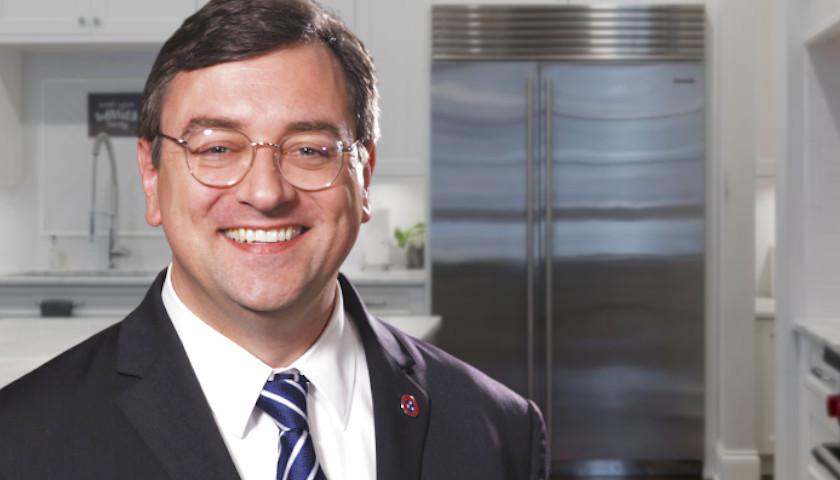Tennessee Attorney General Jonathon Skrmetti led two coalitions of states in filing a six-page letter opposing new Department of Energy (DOE) regulations on household appliances. One set of regulations applies to refrigerators, refrigerator-freezers, and freezers. The second set applies to washing machines.
Filed as a public comment, Skrmetti disparaged the new regulations as “yet another rule to micro-manage the lives—and kitchens—of Americans.”
The filing comes as New York lawmakers on Wednesday banned gas stoves in new buildings. The measure also prohibits new propane and heating oil hookups, which affects rural residents with relatively limited access to the state’s antiquated electric infrastructure. In early April, the Tennessee attorney general led a coalition of 20 states to oppose a push by the Biden Administration to impose similar limits nationwide.
The DOE’s new proposals are the latest in a series of regulations that take aim at different uses of energy in Americans’ homes. Critics of these types of rules say that they could dramatically increase the costs of households’ heating, cooling, cooking, and cleaning.
State attorneys general – 17 in all – from Alabama, Arkansas, Florida, Georgia, Indiana, Iowa, Kentucky, Louisiana, Mississippi, Missouri, Montana, Nebraska, Ohio, Oklahoma, South Carolina, Texas, and Virginia joined Skrmetti’s detailed opposition to the new proposed regulations on refrigerators, refrigerator-freezers, and freezers.
Skrmetti argued that the Department of Energy (DOE) used faulty estimates from the Interagency Working Group on the Social Cost of Greenhouse Gases (IWG) on which to base the new regulations. He cited a case from the Fifth Circuit Court of Appeals, which said that the DOE “must exercise discretion in . . . deciding to use the” IWG estimates.
Citing the DOE’s own words, the Attorney General noted “[a]n estimated 27.5 percent of all refrigerator, refrigerator-freezer, and freezer consumers experience a net cost.” Furthermore, “[a]n estimated 12 percent of all low-income households experience a net cost.” Skrmetti contended that although the DOE downplayed these costs, it is unfair to burden families living paycheck-to-paycheck with even a small amount of unnecessary expenses.
Skrmetti stated that “[t]he IWG used a fatally flawed model to generate those estimates. Furthermore, the estimates are unlawfully promulgated and inconsistent with the [Energy Policy and Conservation Act].”
“Thus,” he wrote, there is “no reason for the Department to conclude that the Proposed Standards’ effect on greenhouse gases will have a measurable economic impact.”
The 20 states joining Skrmetti’s comment in opposition to new washing machine regulations include Alabama, Arkansas, Florida, Georgia, Idaho, Indiana, Iowa, Kentucky, Louisiana, Mississippi, Missouri, Montana, Nebraska, Ohio, Oklahoma, South Carolina, Texas, Utah, Virginia, and West Virginia.
Just as in the refrigerators complaint, Skrmetti’s qualms here center around the faulty IWG estimates, and how the DOE should not have used them to inform new regulations.
The AG Skrmetti notes several issues with the DOE’s analysis of washing machine efficiency. The first is that if consumers do not believe the washer to be cleaning their clothes well enough using less water, they will likely “take some sort of action to compensate, including adding their own water to the cycle or choosing to largely or exclusively use deep fill and deep water wash options on their clothes washer.”
He also argued that new regulations will affect the reliability of the machines: “Decreased water and energy use—i.e., increased operational efficiency—almost always come at the cost of increased complexity, with attendant increased maintenance costs and decreased lifespan.”
Skrmetti again sums up the issues with IWG estimates and why in using them the DOE improperly informed their decisions. Lastly, he states his disapproval with the DOE’s seeming dismissal of consumers’ reactions and preferences.
These new regulations come after the Biden Administration’s previous attempts to regulate which stoves Americans may use, regulations against which Attorney General Skrmetti also filed a complaint. Similar rules have not held up when contested in court.
– – –
Mac Roberts is a reporter at The Tennessee Star. Email tips to [email protected].





